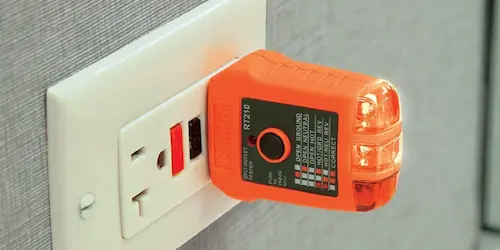Why Does my GFCI Outlet Keep Tripping?

It is important to know how to troubleshoot your GFCI outlet if, for whatever reason, it starts to trip. After all, GFCI receptacles are meant to prevent electrical ground faults by disconnecting any electricity that could flow through the outlet.
No matter how small or large the electrical current, ground fault circuit interrupters are designed to quickly disconnect all power leading to the outlet. This is why it is very important to check your GFCI outlets to be sure that they are working properly. You can do so by pressing the “test” and “reset” pushdown buttons.
Recommended Products

GFCI outlets are commonly used in wet or damp areas, such as kitchens, bathrooms, pool houses, and other outdoor areas. The National Electrical Code, or NEC, sets the electrical standards for GFCI outlets, from how they should be installed to where you should install them.
Article 210.8 states that all GFCI receptacles can be used for any 125-volt, single-phase, 15-amp or 20-amp electrical outlets.
Problem:
If your GFCI outlet is continually tripping, it could probably benefit from some further investigation. It’s no secret that like most things, GFCI outlets do not last forever. In fact, although they can have a lifespan of about 15 to 25 years, some GFCI’s can fail as early as 5 years. Electrical trips, also known as ground faults, can occur for the following reasons:
- Worn out insulation
- Conductive dust or debris
- Water
- Electrical wiring deterioration

You should try to look for what is causing the leak in the electrical current. If your insulation is worn out, old, or damaged, it could cause your GFCI to trip. The insulation is in the wall is meant to help prevent such leaks from occurring. So if your insulation is worn, this can cause more leaks.
Sometimes having too much equipment or appliances plugged in can also cause your GFCI to trip. You can test this easily by using a leakage current clamp meter. This meter will measure the amount of electricity flowing through circuit and will help you diagnose what is causing your electrical outlet to trip. You can also use a ground fault receptacle tester as well.

Solution:
- Remove the GFCI outlet and replace it. If the problem is fixed, then you know that the GFCI was the initial cause of the tripping.
- If removing the outlet, and the problem persists, it is likely that it could be another outlet on the line, or the circuit breaker itself.

GFCI outlets are extremely easy to replace and are much more cost effective than replacing an entire circuit board. You may even want to consider a self-testing GFCI outlet. For your own safety, never do any electrical work that you are uncomfortable with. Always call an Electrician!
Recommended Reading
Routine testing can ensure your GFCI outlets work properly as well as let you know when it's time to replace them.
The National Electric Code (NEC) requires that all home have ground fault circuit interrupters, or GFCI outlets. These outlets detect electrical leaks and shut off the power if danger arises, which keeps your home and your electrical devices safer.
Recommended Products
Receive special deals and more, right to your inbox
Receive special deals and more, right to your inbox







